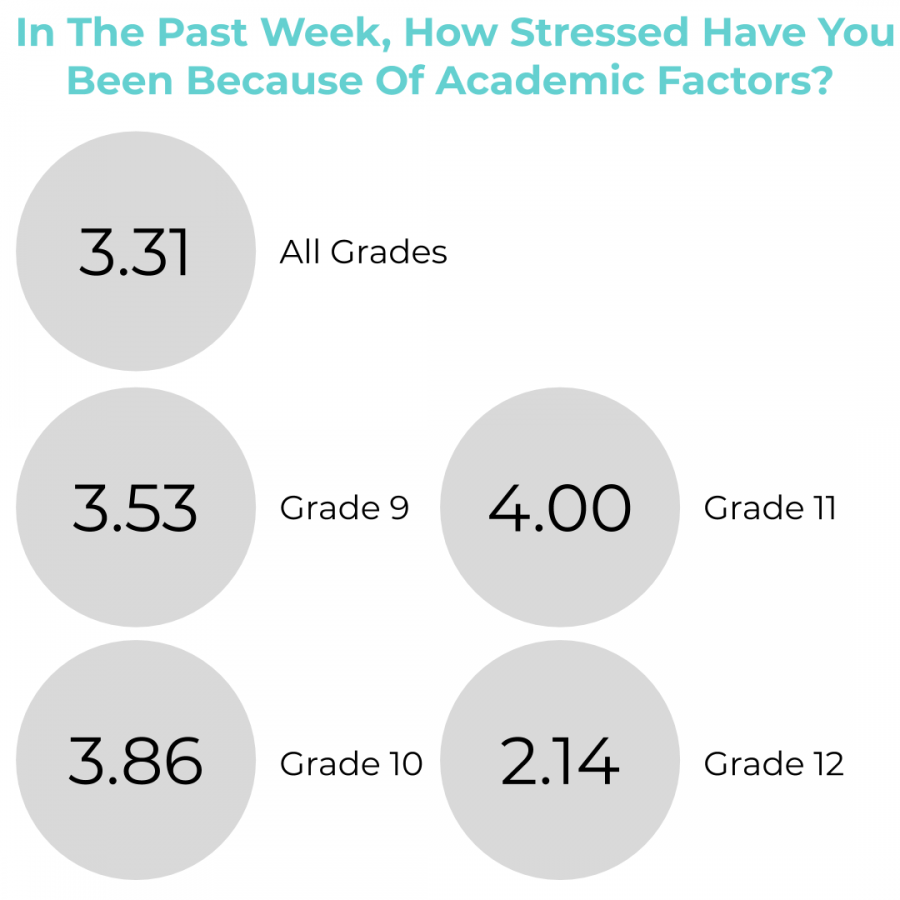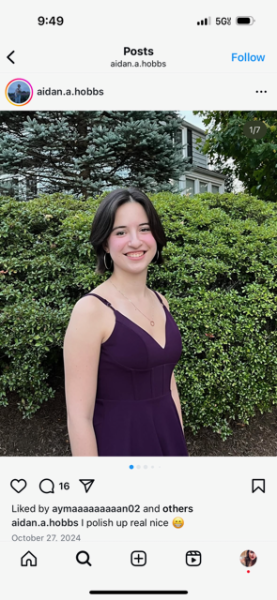Gauging students’ emotions during the pandemic
Students who responded to a Google Survey recorded their stress levels on a scale from one to five. Juniors felt the most stress due to academic factors and seniors felt the least stress.
In just a few days, the world changed when the COVID-19 pandemic spread across the United States and no one knows when this will end and what the future will look like. Naturally this has caused fear, anxiety, and stress for many people.
“I think it’s especially concerning because we don’t really have an end date, which makes it concerning because we can’t really start to figure out as a society once this is over how we’re going to adjust going forward if we don’t have any clue how long it will last before we can do that,” senior Abby Martinage said.
Scientists have made it clear that in order to slow the spread of COVID-19, everyone needs to be taking it seriously. On top of losing everything once deemed normal, many students said that they fear that the government is not doing enough to prevent the outbreak.
“[Watching the news] seems to exacerbate this fear that a lot of people have that this virus is continuing to be a partisan thing,” Martinage said. “It’s a global pandemic that we need to work together on and yet people are still making digs at each other for no reason.”
A Google Form survey was made available to all students at the school from May 4-8. Of the sample population of students who responded to the survey, students consumed an average of 1.17 hours of news per day. Watching the news is a difficult decision — people want to stay informed about the current situation, but do not want the stress that watching the news brings. This is why many students have turned to positive news outlets such as Good News Movement on Instagram to stay up-to-date.
“The first couple of weeks of quarantine, I was watching the news with my mom nonstop,” an anonymous junior said. “That was constantly stressful for me. There’s just so much going on. A lot of people are really struggling. I stopped watching the news and I started getting the information from news outlets. I would read the newspaper digitally… I’m trying to be a little more intentional of the news I’m consuming.”
For healthy teenagers, there are relatively few consequences, but it is important to understand that to many, this virus can be deadly. It is important now more than ever that students are selfless and doing what is best for the community. However, not being in the ‘at risk’ category for the virus does not mean it cannot impact students.
“We can’t all have what we want,” Martinage said. “There are bigger problems right now and we need to acknowledge that there are bigger problems than our own problems… [But] the fact that there are some things bigger than the issue of not graduating doesn’t mean that it doesn’t matter.”
The cancellation of school is especially difficult for students as these months were supposed enjoying the last few months of their school year. When Virginia Governor Ralph Northam announced that schools would be closed for the remainder of the year, it hit many students that they would not be seeing many of their classmates until September.
“I remember realizing that school was going to be closed for a month,” an anonymous junior said. “I remember sitting there and the thought was [going] over and over in my head. The same thing happened when I realized we were going to be closed through the end of the academic year… It’s a lot now to look at how we could be here for months. We could be in this state for months. I’m really just trying to take it hour by hour.”
In addition to leaving the school community, people are quarantined at home with their family members. Some people can be quick to anger when stressed, which creates family conflicts now that people cannot go to school to get some space.
“[My family is] not really tired with each other because we’re all getting along pretty well and we all enjoy being with each other, but the frustration with being stuck inside and with the pandemic itself and how it’s being handled comes out in casual arguments sometimes,” Martinage said.
Being home from school has a silver-lining for some, however. School can be stressful for many people, with 71 percent of students having reported feeling anxious before COVID-19, and some have commented that being away from school and having more flexible deadlines has decreased their stress levels.
“I really do miss my friends a lot,” senior Ziad Kamil said. “Seeing them in person was really good, but also I think my general wellbeing has increased sense I have not had to worry about getting good enough grades for college and turning in homework and all that stuff.”
Many students like the new system where they can do work for fourth quarter to raise their grade, but are not forced to do the work if they do not want to. Many like having school work because it provides them with something to do and gives them a distraction from the crisis.
“I really like that there’s still school that is happening,” Kamil said. “You can do classes. I think it’s a great idea to stop grading because some students just don’t work well in online environments and it’s unfair to grade them that way when they’re forced to.”
While many students like having optional work, many teachers give students work that is due on Friday and students have said that without the structure of deadlines it is difficult to stay motivated. This is yet another reason students are grateful that fourth quarter cannot negatively impact their final grades.
“I’m trying to be better about this,” Martinage said. “It’s been kind of hard to find motivation… I had an easier time motivating myself when I knew I was going to be seeing my teachers… Trying to take advantage of that attempt at normalcy that the school is giving us is helpful too.”
Students also like the social aspect that comes with school. While nothing replaces face-to-face interaction, many teachers are holding virtual class discussions which gives students the opportunity to interact with their peers.
“I’ve really enjoyed [virtual class discussions],” Martinage said. “They make me feel a lot better… In general, doing discussion-based learning has been really helpful for me… Something where it’s a little bit less time-intensive and a little more casual and just spending time with people [helps me a lot].”
Students understand that they are not expected to be putting in the same amount of effort to schoolwork as before this pandemic. However, school is one of the few things students are doing to occupy their time and many students appreciate teachers having ‘fun’ assignments that are not directly related to their class.
“Mr. [Robert] Summers’ [Anthropology & Philosophy] has always been pretty entertaining,” Kamil said. “He has released stuff on Canvas that isn’t all strictly school-related, which is nice. But otherwise, I check Canvas sometimes to do work but not really anything else.”
In a building of almost 2,500 people, there were lots of opportunities to have human interaction at school. However, the school has made efforts to make sure that students do not feel completely cut-off from others and that they can still get help when they need it. 43 percent of students reported talking to their counselor since school has closed.
“I’ve really benefited just from my teachers being available for contact,” Martinage said. “Feeling like I can just send out an email and be in contact with my teachers, my counselor, my administrators whenever I need to be has made everything feel a little bit easier. I don’t feel completely cut-off from the school.”
During this time of crisis, students pointed out that it is okay to take a break from schoolwork and it does not make someone a ‘bad student’ to take some time off or not put in 100 percent effort. They hope that their parents and teachers understand that.
“I think parents could maybe understand that for students there is a big void in our lives right now,” Kamil said. “We really do have nothing to do besides online schooling and [they should] maybe try to be more understanding of that. I think teachers could maybe understand that not everyone does well in online schooling, and it can be tough to constantly check deadlines and adjust to the new learning environment.”
Counselors and mental health professionals stress that it is important for students to hold onto normalcy where they can, keep in contact with their friends to stay aware of what is going on in their lives and take time for themselves. However, it is important to understand that this is an unprecedented time and it can be hard to always look on the bright side.
“It is so difficult for everyone right now,” an anonymous junior said. “Some people are faced with some real problems. That’s really difficult, but at the same time, it’s important to note that this stress that you’re feeling, everything that you’re going through is still valid and people deserve recognition for that.”










